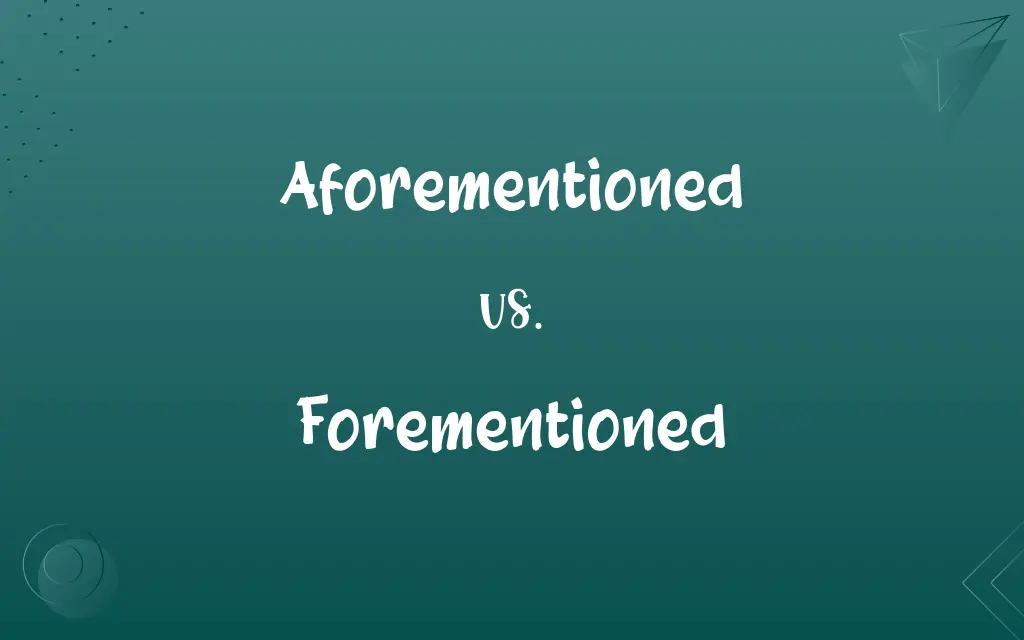Aforementioned vs. Forementioned: Know the Difference
Aforementioned refers to something mentioned earlier in a text, while forementioned, a less common and somewhat archaic term, serves a similar purpose, referring to previously mentioned items.

Key Differences
Aforementioned is commonly used in written and spoken English to refer to something that was mentioned earlier in the text or conversation. Forementioned, though similar in meaning, is less commonly used and considered somewhat archaic or formal.
The term aforementioned is often found in legal, academic, and formal documents to avoid repetition by referring back to previously stated facts, items, or subjects. Forementioned, while serving a similar purpose, is less prevalent in modern usage and may appear more in historical or very formal contexts.
Using "aforementioned" helps in maintaining clarity and coherence in a narrative or argument by tying back to earlier points without redundancy. The use of "forementioned" can achieve the same objective, but its rarity in contemporary language might make it less immediately clear to some readers.
The appropriateness of "aforementioned" is widely recognized in professional and academic writing. On the other hand, "forementioned" might be perceived as stylistically outdated or overly formal in many modern writing contexts.
Both "aforementioned" and "forementioned" are adjectives used to avoid repetitive mentions of the same subject. However, "aforementioned" is more universally understood and accepted in modern English usage.
ADVERTISEMENT
Comparison Chart
Usage Frequency
Commonly used in modern English.
Less common, somewhat archaic.
Contexts
Legal, academic, formal documents.
Historical, very formal contexts.
Clarity in Modern Usage
Widely understood and recognized.
May be less clear due to rarity.
Stylistic Appropriateness
Suitable for contemporary writing.
Seen as outdated or overly formal.
Function
Refers back to previously stated points.
Serves a similar referential function.
ADVERTISEMENT
Aforementioned and Forementioned Definitions
Aforementioned
Previously mentioned in a text.
The aforementioned study provides valuable insights.
Forementioned
Pertaining to subjects talked about earlier.
The resources for the forementioned project have been allocated.
Aforementioned
Used to avoid repetition of a subject.
The aforementioned reasons justify the decision.
Forementioned
Relating to things previously stated or written.
The forementioned authors have significantly contributed to the field.
Aforementioned
Pertaining to earlier content.
The aforementioned articles were included in the bibliography.
ADVERTISEMENT
Forementioned
Used in formal contexts to denote earlier mentions.
The forementioned provisions are applicable to all members.
Aforementioned
Referring to something already discussed.
As per the aforementioned agreement, the payment was made on time.
Forementioned
Referring back to previously discussed points.
The forementioned arguments were considered in the final verdict.
Aforementioned
Mentioned previously.
Forementioned
Something mentioned before in a document.
The forementioned chapters outline the theory's fundamentals.
Aforementioned
The one or ones mentioned previously.
Forementioned
Alternative form of aforementioned
Aforementioned
Previously mentioned.
It wasn't until later that we realized that the aforementioned caller and this taciturn man were the same person.
Forementioned
Mentioned before; already cited; aforementioned.
Aforementioned
(uncountable) The one or ones mentioned previously.
The judge read a list of prisoners' names. She then indicated that the aforementioned were to be set free.
Aforementioned
Previously mentioned; before-mentioned.
Aforementioned
Being the one previously mentioned or spoken of;
Works of all the aforementioned authors
Said party has denied the charges
Aforementioned
Relating to previously mentioned facts.
The results support the aforementioned hypothesis.
Repeatedly Asked Queries
How is "forementioned" used?
Similar to "aforementioned", referring to earlier mentions.
Is "aforementioned" commonly used today?
Yes, it's widely used in modern English.
What does "aforementioned" mean?
Refers to something previously mentioned in the text.
What is the primary function of "aforementioned"?
To refer back to something already stated without repeating it.
Does "forementioned" add clarity to a text?
It can, but its rarity might confuse modern readers.
Is "forementioned" suitable for academic writing?
It's less common and may appear overly formal.
How does "aforementioned" improve writing?
It helps avoid repetition and maintains coherence.
Can "aforementioned" be used in legal documents?
Yes, it's often used in legal contexts.
Where is "aforementioned" most appropriately used?
In formal, academic, and professional writing.
Is "forementioned" a modern term?
No, it's considered somewhat archaic.
Can "forementioned" be used in everyday language?
It's not common in everyday speech and may sound formal.
Are there synonyms for "aforementioned"?
Yes, terms like "previously mentioned" or "earlier stated" are similar.
Should "forementioned" be used in modern texts?
It's better to use more contemporary terms.
Is "aforementioned" specific to English legal language?
While common in legal language, it's not exclusive to it.
How often is "aforementioned" used in academic papers?
It's frequently used to refer to previous points or references.
What are alternatives to "forementioned"?
"Previously mentioned" or "aforementioned" are alternatives.
Can "forementioned" be confusing in current usage?
Its rarity might make it less immediately understandable.
Can "aforementioned" be used in informal writing?
It can, but it might sound overly formal.
Is "forementioned" considered outdated?
It's seen as stylistically outdated in many contexts.
What is the best context to use "forementioned"?
In historical, very formal, or stylistically specific texts.
Share this page
Link for your blog / website
HTML
Link to share via messenger








































































